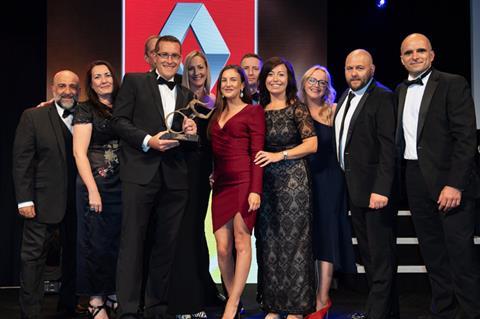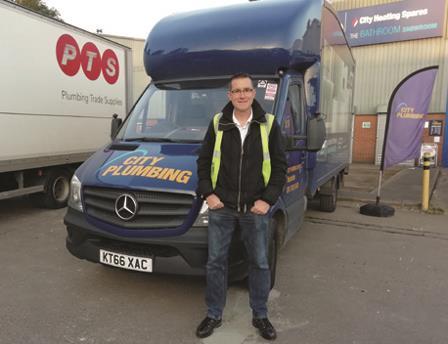
Transforming the way it approached its fleet management strategy resulted in a well-deserved Fleet Van Operator of the Year award this year for City Plumbing Supplies.
Managing 370 autonomous operating centres that are responsible for 680 vehicles is a tall order by anyone’s reckoning, particularly when staff have historically been geared up for sales rather than transport.
But City Plumbing Supplies (CPS) overcame this huge logistical challenge with an innovative transformation programme that led to it winning the Fleet Van Operator of the Year at the Motor Transport Awards 2019.
The plumbing and heating company, part of the Travis Perkins group, spans the trade, home improvement and DIY markets and employs more than 4,500 staff across the UK and Ireland.
A realisation five years ago that the company had grown so much it had lost vital contact with its customers led to a process of divisionalisation, making each branch closer and more in touch with its end users.
The programme was a success, but also created a new challenge: how to keep on top of its transport compliance obligations across a scattered and autonomous network?
The answer was ACCESS, the brainchild of CPS’ newly appointed head of fleet, Richard Horton.
“When I joined the division I was given a broad remit,” he says. “The main objective was around compliance, but I wanted to look at everything else too. I knew all the things a good fleet operator should be looking at, it was just about pulling it all together in one programme.”
Horton’s solution was a programme that could give customers the best delivery service in the industry.
It comprises six key areas, which Horton abbreviated to ACCESS: Availability, Compliance, Commerciality, Efficiency, Safety and Service.
“I didn’t want to tackle one area at a time,” he explains. “Compliance was the big one for us, but we were already thinking about efficiency, safety and service too.”
Led by a small, dedicated team headed up by Horton, the ACCESS initiative has enabled CPS to move further ahead of the competition and deliver record sales figures.
The first step of the programme was to ensure that the right fleet vehicles were in the right branches for the delivery operations required – ‘Availability’.
The fleet is controlled via CPS’ master control database, which links fleet data such as registrations; vehicle builds, transfers and disposals; MoT expiry dates; PMI service dates and LOLER inspections; and improves visibility of the fleet and compliance.
Fleet replacement
An annual fleet replacement process is also conducted to review the current fleet requirements and compare against projected future needs.
This is co-ordinated in conjunction with CPS’ finance team to ensure funding is secured as required in advance of the company’s annual operating plan.

Just in this one area alone, a focus on first use checks, more frequent PMIs and a review of national hire agreements led to a reduction in spend on ‘big ticket’ repair and maintenance issues.
Performance, or ‘Compliance’, is measured through a monthly non-compliance scorecard that shows the overall ranking of branches, as well as areas for improvement at a regional level. This is supported by a fleet activity calendar, which delivers communications on a range of topics throughout the year.
CPS says performance was delivered by integrating branch systems, vehicle technology and Google apps, and by homing in on non-compliance, the fleet team could review all areas of O-licensing remotely.
Next comes ‘Commerciality’, where monthly fleet costs are analysed to calculate actual spend per vehicle, per branch. The branch view enables managers to review their average cost per drop charges and the company says it gives them the information to make informed decisions about the best route to market for delivered products.
‘Efficiency’ involved partnering with Microlise and relying on its software to obtain data on areas such as fleet utilisation, delivery zones, route plans and idling.
Then follows ‘Safety’, with a Top 10 list of actions to reduce the risk of accidents, which includes daily alerts on all notified incidents and a monthly report of drivers with multiple incidents in the past 12 months.
Finally comes ‘Service’, which ensures customers receive a great delivery service and has been instrumental in boosting CPS’ sales growth.
“A lot of people would say safety should come first, but if you look at the flow of the topics, safety kicks in once you leave the branch,” Horton explains. “All the four parts before that come into play before you’ve even moved a wheel.”
However, before all of this could be implemented, Horton’s first challenge was to get the branches on board.
“The perception could have been: ‘this is one more thing we are having to do’.”
He needn’t have worried. CPS outlets quickly caught on to the potential cost savings available to them if they followed the programme and recognised that, ultimately, it’s all part of an operator’s existing licensing responsibilities anyway.
“When we first began, there was no history to benchmark, so we created a non-compliant scorecard. A lot of our fleet are vans; we have some 7.5-tonners, but we applied O-licence principles to the whole fleet regardless,” he continues.
“We drew a line in the sand and said, this is the date we start to measure compliance and we expect to see improvements. No-one wants to be on the non-compliant scorecard, but in the past we just didn’t have that visibility.
“ACCESS really brought the transport agenda to the fore and every single year we have seen improvements. The results were phenomenal!”
These improvements really caught the eye of the judges and were instrumental in it winning the MT award.
There has been a 79% reduction in non-compliance; £277,000 in tracked cost savings against plan in 2018; a 17% reduction in blameworthy incidents over the past three years; and CPS is currently sitting pretty with a green OCRS.
One judge pointed out the “significant change” that has been brought about now that vehicles are being managed from a fleet perspective, rather than from a branch sales team.
Scattered network
Another commented that CPS had shown “it is doing a lot that is right and there is excellent use of IT and telematics, not least in improving control of a scattered network.
“The steady reduction in tachograph and other compliance infringements is impressive. And I like the involvement in Cranfield in accident investigation.”
Knowing that your infringements will be recorded and used to rank your branch inevitably helped alter driver behaviours, but even Horton was taken aback by how much it was improved.
“We issued the scorecards every month,” he says. “When the programme began, branches were getting 100 points, but now it’s between 10 and 15.
“It’s improving every year, because of the focus we put on it. It’s a calendar of activity that will continue; it’s about ‘beating the drum’, getting the message out and then it’s business as usual.
“And we’ve added new bits to the cards as well. With a van fleet, the driver can treat it like a car so we look at the efficiencies of the fleet: where are they delivering? Are they straying into other areas?
“As and when we see new opportunities coming up we will add them to the programme.”
Horton stresses that ACCESS offers no financial incentives to drivers or branches: “It’s not optional, it’s the law and what we do,” he says.
“It makes you a good operator. We run a driver of the month competition; we look at telematics and centrally we identify who is driving well through Microlise and then this goes into an annual competition. Even with that there’s no financial incentive, just recognition for the driver.
“It’s about everyone in the branches taking personal responsibility for being the best. The company strategy is about being personal and being local. We all have a responsibility to each other and our customers. It’s hardwired into everything we do here.”
Another judge on the awards panel congratulated the company on a “fine effort” and added that it was “a very good submission that for a smaller company exemplified the professional approach they have adopted and the successful results they have achieved.
“This was a highly positive and welcomed submission by a company that has striven to be better at what it does and continue to push customer service and all round operator professionalism in the process.”
Horton says he was confident ACCESS would work; it wasn’t a complicated programme and was simply about focusing the minds of employees on its transport assets.
But he also sees it as part of a broader aim to help CPS deliver increased business profitability.
“Five years ago I came to work here in the plumbing and heating division and then we started this programme. It was a real opportunity following the divisionalised programme to make our mark. It was more than just managing the fleet; it was a vision of the future and how to improve efficiency and compliance.”











